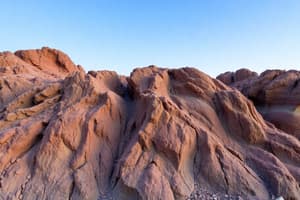Podcast
Questions and Answers
Which rock forms from a chemical reaction in seawater?
Which rock forms from a chemical reaction in seawater?
- Diorite
- Obsidian
- Limestone (correct)
- Basalt
Which rock may contain fossils?
Which rock may contain fossils?
- Obsidian
- Diorite
- Limestone (correct)
- Basalt
Which rock forms from cooling magma that does not contain a lot of quartz or light-colored minerals?
Which rock forms from cooling magma that does not contain a lot of quartz or light-colored minerals?
- Diorite (correct)
- Obsidian
- Limestone
- Basalt
Which rock forms from rapid-cooling lava that has a lot of silica and does not have time to form crystals?
Which rock forms from rapid-cooling lava that has a lot of silica and does not have time to form crystals?
Which rock may contain gas bubbles and is sometimes called vesicular basalt?
Which rock may contain gas bubbles and is sometimes called vesicular basalt?
Flashcards are hidden until you start studying
Study Notes
- Obsidian is an igneous rock that is black, glassy, and breaks like glass.
- It forms from rapid-cooling lava that has a lot of silica and does not have time to form crystals.
- Limestone is a sedimentary rock that is usually white, gray, or tan and may contain fossils.
- It forms from a chemical reaction in seawater that makes lime mud that sinks to the bottom of the limestone.
- Basalt is an igneous rock that is dark gray to black, fine-grained, and hard.
- It forms from a magma rich in iron and magnesium and poor in silica, which erupts from a volcano or fissure.
- Diorite is an igneous rock that is medium to dark gray, coarse-grained, and dark-colored.
- It forms deep in the Earth's crust from cooling magma that does not contain a lot of quartz or light-colored minerals.
- Dolostone is a related rock to limestone that is composed of the mineral dolomite and does not fizz with vinegar.
- Basalt may contain gas bubbles and is sometimes called vesicular basalt.
Studying That Suits You
Use AI to generate personalized quizzes and flashcards to suit your learning preferences.




